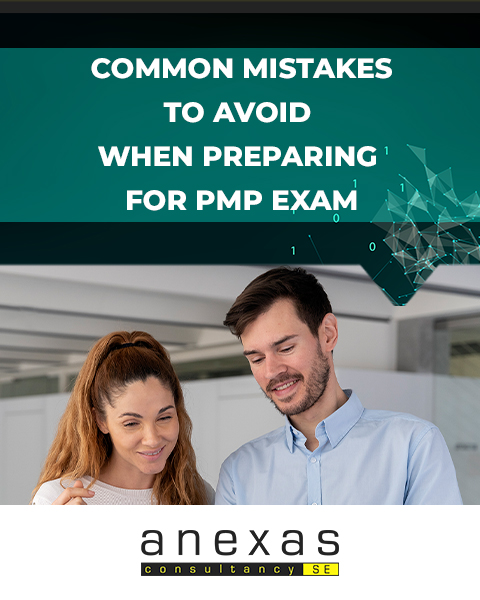Common Mistakes to Avoid When Preparing for PMP Exam
The Project Management Professional (PMP) certification exam is challenging. Proper planning for preparation and full-length awareness of the questions are two key factors to pass the PMP examination. Along with that a good command of the domain knowledge is essential for this certification process
To qualify for the PMP exam, applicants must complete the application process, which mandates relevant work experience and education. The exam itself is a computer-based test that spans 4 hours, featuring 200 multiple-choice questions that evaluate a participant’s understanding of project management processes, knowledge areas, tools, and techniques.
In this article, we will discuss what are the common mistakes in the PMP certification exam and how to avoid these errors

What are the common mistakes in the PMP certification exam?
Unawareness of exam format
As per the format of the PMP certification exam, there are 200 multiple-choice questions and the duration is four hours. If you are not aware of the format, it becomes difficult to complete the exam on time. Also, there is a lack of preparation in terms of solving multiple-choice questions.
Join our Free PMP Workshop to learn the tips and tricks to pass the PMP exam. In the 2 hours session, you will learn about the fundamentals of PMP, industry-based tools, and the requirements of the PMP exam.
Not adhering to 35 hours of Training requirement
One of the criteria for this certification exam is adhering to 35 hours of training requirement. Lack of knowledge on the hours of training results in lack of preparation to pass the exam
Dependency on Academic Knowledge:
This exam is a testing procedure for professionals of their academic as well as practical exposure. It is important to prepare both academic and practical knowledge through completing training hours and projects.
Inadequate preparation:
The requirement for the achievement of the PMP exam is a significant amount of preparation which includes a reading of several study materials. But most of the time working professionals do not have enough time to take adequate preparation. The PMP exam covers a wide range of topics and it requires a significant amount of time management in studying and reviewing the PMBOK guide. It is also essential to solve PMP mock questions to get a clear idea about exam patterns and questions.
Unable to read the exam questions carefully
There is another condition for not qualifying for this exam is that participants fail to read the exam questions carefully in the PMP exam due to poor time management. The participant must have adequate time in hand to read the questions carefully.
Lack of understanding of the PMBOK guide
The master reference guide for appearing on the PMP exam is the PMBOK guide. Participants must have a clear understanding of key concepts, tools and techniques, inputs, and outputs. It is essential to understand the underlying principle rather than memorising every aspect of the PMP exam.
Changing Exam Structure
So far as the structure of the exam is concerned it is observed that the exam pattern is getting changed over a period of time along with the formats and content. Lack of awareness of the current changes in the exam pattern will be a challenging issue for the PMP exam preparation.
Inadequate time management
It is a crucial factor as participants must answer 200 multiple choice questions within 4 hours of time span. Reading questions, understanding and selecting the right answers is the dividend of proper time management.
How to avoid common mistakes in the PMP exam?
- Read the content of the questions with proper planning of time management
- Planned schedule for regular study
- Attempt as many as a mock exam to know the weak points before the final exam
- Regular practice of formulas and calculations to avoid mistakes in exams
- Consider PMBOK as a master guide and read it as many times to get confidence
- Go through online portals other than PMBOK study material
- Attend a training course for the PMP exam preparation
Attend a PMP certification prep course
You can join our PMP training program to prepare for the PMP exam in 2023. Anexas is an accredited training organization by PMI and we cover the updated syllabus for the PMP exam. You can learn more about the program by visiting this link-
Conclusion
It is very essential to know the tools and techniques to avoid common mistakes in the PMP exam, but with the right amount of preparation and dedication, you can pass the exam. The chances of failure are reduced by following tips and tricks with utmost care. A well-planned strategy with proper time management and regular study will help to avoid mistakes.
Frequently asked questions (FAQs)
What kind of questions are asked in PMP?
The exam consists of 200 multiple-choice questions that comprise five process groups (Initiation, Planning, Executing, Monitoring and Controlling, and Closing) and nine knowledge areas (Integration, Scope, Time, Cost, Quality, Human Resource, Communication, Risk, and Procurement).
What do I need to memorise for the PMP exam?
PMBOK guide is the master guide to follow and prepare for the certification exam. So it is the only reliable resource to memorise for the PMP exam.
How can I pass the PMP certification exam?
- To prepare for the exam, create your study schedule
- Solve mock questions and exam simulators provided by PMP
- Join a reputed online training provider for a thorough preparation
What is the new PMP exam format?
New domains have been added to the PMP Certification exam. They include a wider range of skills and approaches. The new PMP certification exam will be focused on three domains.
- People – This will be focusing on the skills and activities required to effectively lead a project team.
- Process – Strengthening the technical aspects of project management.
- Business Environment – Focusing on the link between projects and organisational strategies.
What people fail the PMP?
- Not Preparing Enough. The most common reason people fail to pass the PMP is a lack of preparation.
- Not Taking a PMP Exam Prep Course.
- Focusing on the Wrong Concepts.
- Only Using Free Resources.
What is the hardest part of PMP?
Failing to understand the PMBOK way of project management. The main reason why participants find this exam difficult is that they fail to understand the PMBOK way of project management.
What is the difference between contact hours and PDU?
The contact hour is equal to one hour of classroom instruction. Only the hours you spent on project management in a PMP course can count towards the total. PDUs are used to measure approved professional services and learning activities.
What is the PMP application process?
You can apply if you’re eligible to take the PMP exam. To do this, you will need to create an account on the PMI site. The application will be found under the “my PMP” section. It remains open for the next 90 days after you have submitted your application. It is not possible to cancel the application, but you can save it for later editing. Within five business days of your submission, you will receive an acceptance confirmation.
Which edition of PMBOK guide should I use to prepare for the certification exam?
Project Management Institute (PMI) recommends that you refer to the PMBOK guide 6th Edition for PMP exam preparation.
Can I apply for re-evaluation if I fail in the PMP certification exam?
Yes, you can apply for re-evaluation. You can submit a written request to the PMI® Certification Department for reviewing their decision.





